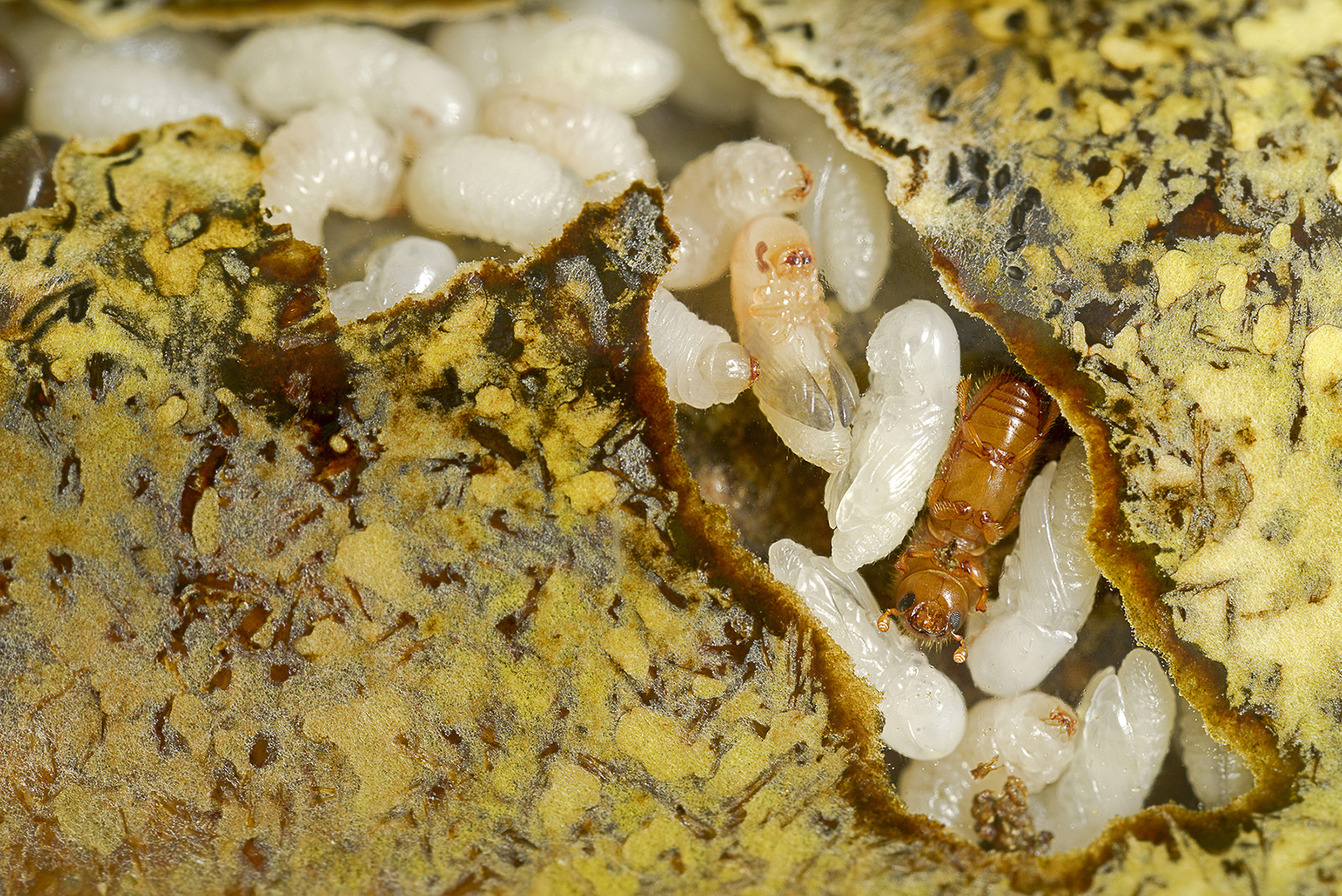Functions of Microbial Symbionts in Fungus-farming Beetles
Ambrosia beetles, like the fruittree pinhole borer Xyleborinus saxesenii, live within self-dwelled systems in wood. On the walls of the tunnels and chambers, they grow their fungal gardens. The gardens are dominated by two food fungi, but other microbes grow there as well. Some mold fungi seem to be parasitic, and they negatively affect the beetles’ offspring numbers. In this project, we aim at gaining insights into the factors influencing the composition of the microbial community in the beetles’ nests and the mechanisms of beetle fungiculture.
In a first step, we identify the community of microbes associated with two native ambrosia beetle species, the fruittree pinhole borer X. saxesenii and the black timber bark beetle Xylosandrus germanus. We investigate the succession in which different microbes occur within the nests. Subsequently, we test how these microbes interact with each other. To this end, we apply state-of-the-art molecular and visualizing techniques (i.e., next-generation sequencing, SEM, FISH).
Previous studies have indicated that X. saxesenii beetles are able to influence the fungi growing in their nests in two ways: First, they are able to suppress the spread of molds. Second, they can enhance the growth and fruiting of their food fungus. Only in presence of beetles, the fungus produces fruiting bodies, so called conidia. The underlying mechanisms of these effects are also studied in this project. Preliminary results indicate that the beetles make use of other symbionts, which hence represent additional mutualistic player in this system, besides the beetles and their food fungus.
Social Immunity in Ambrosia Beetles & Chemical Recognition of Fungal Symbionts
In complex insect societies, the different individuals live in close spatial association and are highly related to each other. These two factors should favor the spread of parasites, but also the evolution of social behaviors to fight them, apart from chemical defense mechanisms. In the first part of this project, we study the social defense mechanisms in the ambrosia beetle Xyleborinus saxesenii. To this end, we experimentally expose them to pathogenic microorganisms, namely mold fungi. First results show that the beetles actively up-regulate hygienic behaviors like grooming each other (allo-grooming) and themselves (self-grooming), thereby likely reducing parasite load on their body surfaces, and cannibalism, thereby getting rid of infected individuals. Such collective pathogen defenses (social immunity) have been unknown in beetles so far.
In the second part of this project, we test if the beetles use olfactory cues to orient themselves during dispersal in order to locate a suitable habitat, i.e., a tree that has recently died and probably has specific chemical characteristics. In a pilot study, we found that the beetles are attracted to the volatiles of their main mutualistic fungus and to ethanol, which is emitted by recently dead trees due to degradation processes. This indicates that the beetles select new breeding grounds based on the presence of conspecifics that have already found a fungus garden successfully, and on the status of the host tree. Surprisingly, we did not find a repellent effect of volatiles produced by pathogenic fungi.
Diversity of Fungal Symbionts of Ambrosia Beetles
Ambrosia beetles live in tunnel systems (‘galleries’) within the wood of recently dead or dying trees, where they plant a mixture of fungi on the tunnel walls. Exact compositions of these fungal communities are hardly studied, but it is known that they are dominated by beetle-specific ambrosia fungus species. Ambrosia fungi are Ascomycetes belonging to the genera Raffaelea (Sordariomycetidae), Ambrosiella (Ceratocystidaceae) or Fusarium (Hypocreales). They produce swollen hyphens, which serve as the beetles’ sole food source. It is known that the fungi reproduce asexually, but it has never been investigated if sexual reproduction also occurs. When females leave their natal nest and disperse, they carry asexual spores to their new nest, a mechanism called vertical transmission. However, it is also not fully clear if occasional transmission between existing nests (horizontal transmission) is possible.
If the fungi only reproduce asexually, and if vertical transmission is the only way spores reach new nests, the result would be low genetic diversity of fungi among beetle populations. In this project, we determine the genetic diversity of fungi from beetle populations all around Central Europe. The aim is to unravel the respective diversity of Ambrosiella or Raffaelea genotypes across and within beetle populations. Our results will help to understand how frequently horizontal exchange of symbiotic fungi occurs between nests, and they will shed light on the occurrence and frequency of sexual reproduction of the fungi. In addition, new fungi species will be identified in collaboration with T. Harrington.
Interactions of Native and Invasive Ambrosia Beetles
International movement of non-native forest insects poses a severe threat to forests worldwide. Bark and ambrosia beetles (Curculionidae: Scolytinae) represent one of the most successful groups of invaders, in part because they are easily transported in wood products and packaging material. As international trade continues to steadily increase, the risks of introducing these organisms are also on the rise. Understanding why bark and ambrosia beetles establish so easily in habitats outside their native range is recognized as a research priority by both scientists and forest managers, with the aim to promote risk assessment and management strategies for non-native species.
In this project, we want to assess what effect non-native ambrosia beetle species can have on native ones. Therefore, we test the competitive abilities of a native versus a non-native ambrosia beetle by rearing them together in artificial media. Furthermore, to investigate if competitive effects are mediated by the symbiotic fungi of the beetles, we test the main fungal associate of the two beetle species against each other on agar plates.

